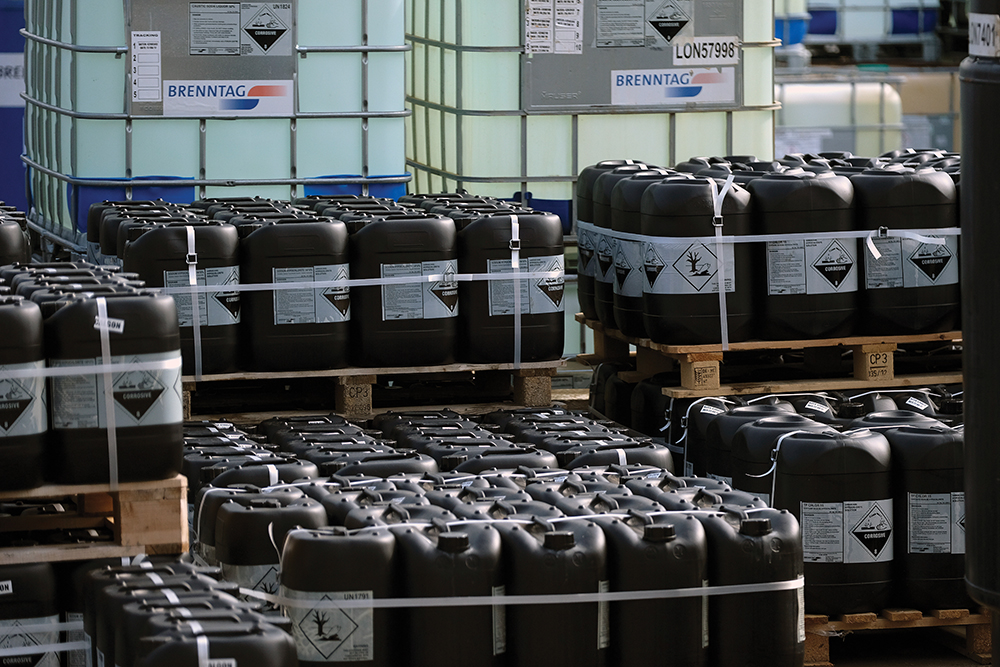By Shaun Myers
Director of Supply Chain and Service, Brenntag UK & Ireland
Plastic is light, cheap, effective and attractive so there is no wonder we use so much in every aspect of our day. However, as David Attenborough’s documentary, Blue Plant II so visually demonstrated, the amount of plastic in the seas (considered by some to be circa 12 million tonnes) is causing considerable harm to birds and sea life. Potentially harmful chemicals are also linked to plastic, and have been found in species from plankton to dolphins. The full consequences to us all is yet to be fully understood.
In the chemical industry plastic packaging not only performs the role of convenience and ease of application, it provides safety. Packaging design offers protection to operators and the public as it reduces the risk of environmental damage through spillage. The chemical industry has sought to fulfil its custodian role in packaging by delivering and collecting packs. Using the very best in design and quality and protecting these assets by an administrative process of deposits and credits( a method developed to speed up turnaround and minimise the size of the packaging fleet). Such a process developed in the 1970’s has been challenged over recent years by competition in the sector and the desire in the market to seek a low unit cost. Consequently, over time the value of the chemical and pack have become merged. Higher specification, heavy duty containers, designed to last many years, lost ground to lower cost packaging often included in the chemical price. Such a market move provided short term cost gains for some, but is it the most effective way to managing packaging?
There must be many a chemical user site holding empty and partly empty packs in a flawed believe in their usefulness, or due to issues in proper and efficient return for effective reuse, disposal or recycling. Packs stored or used for temporary bulk storage for any length of time degrade, their age and history soon forgotten and the risk to the environment or injury only increases. It cannot be a coincidence that over time diesel fuel made its way into the water supply in packs designed for disinfection. Perhaps, in the light of the issues mentioned, the chemical and the pack used to carry it should be considered separately and their individual values fully understood. The supply chain should seek to take a bigger responsibility by selecting the right pack and manage it throughout its life cycle to reduce risk and arguably, in the long term, cost.
Brenntag do have an option for non-returnable packaging which is an area we are conscious does not promote the best use of a container. To that extent, we make every effort to ensure that all our customers are aware we offer a returnable packaging option. Indeed, Brenntag probably owns and manages the largest fleet of chemical returnable packaging within the UK & Ireland and takes responsibility for the environment extremely seriously by seeking ways to reduce any impact.
The UK Government has made it very clear that it is their intention to reduce the amount of plastic and the associated waste in circulation. Many companies, including household names, have signed up to the UK Plastics Pact to cut plastic pollution over the coming years. Brenntag’s commitment to returnable packaging options includes the management and maintenance of the packaging, applicable certification, testing and tracking through the course of their life-span – from the point of first use through to the end of its use. We work with our customers to find the best solution. Clearly there is the potential to positively impact sustainability credentials by using returnable packaging, plus of course the added benefit of eliminating costly charges for the collection and disposal of empty chemical packaging.
It is important to foster a collaborative approach across the supply chain and to this end Brenntag have two notable schemes. The first is to ensure packaging supplied to the food industry is returned and recycled effectively. This ensures that the food manufacturer has the brand new packs they seek to reduce the risk of cross contamination, and that costs are mitigated when the packs are refurbished and supplied into less critical applications in other industries. The second is not in plastic but it is a closed loop system for solvent drums that circulates drums from our customers, back to our supplier be reconditioned to the agreed standard, and then refilled before being resold again into the same market sector.
Brenntag have worked closely with the North American business Valpak, a leading provider on environmental compliance, who have been providing support to companies since 1997 when the first producer responsibility legislation was introduced. Under The Producer Responsibility Obligations (Packaging Waste) Regulations, Brenntag must ensure that a proportion of all waste is recycled. There are different limits for each material and for plastic the current figure is 51%. Whilst Brenntag cannot recycle containers that have been chemically contaminated, they ensure that the appropriate weight equivalent to 51% of our plastic is recycled, Valpak ensure that the correct amount is recycled in the appropriate manner.
As a member of the UN Global Compact since 2014, and one of the top performers for EcoVadis, where Brenntag hold the Gold Recognition Level, we are dedicated to delivering in the area of responsible care. For many years now, we have taken part in the Responsible Care/Responsible Distribution programme and are committed to the eight guiding principles laid down in this global programme.
The recent awareness of the impact of packaging and plastic on our world brings the matter very much to the forefront for all, and can only reinforce the policy Brenntag has taken on returnable packaging for some decades.
www.brenntag.co.uk





